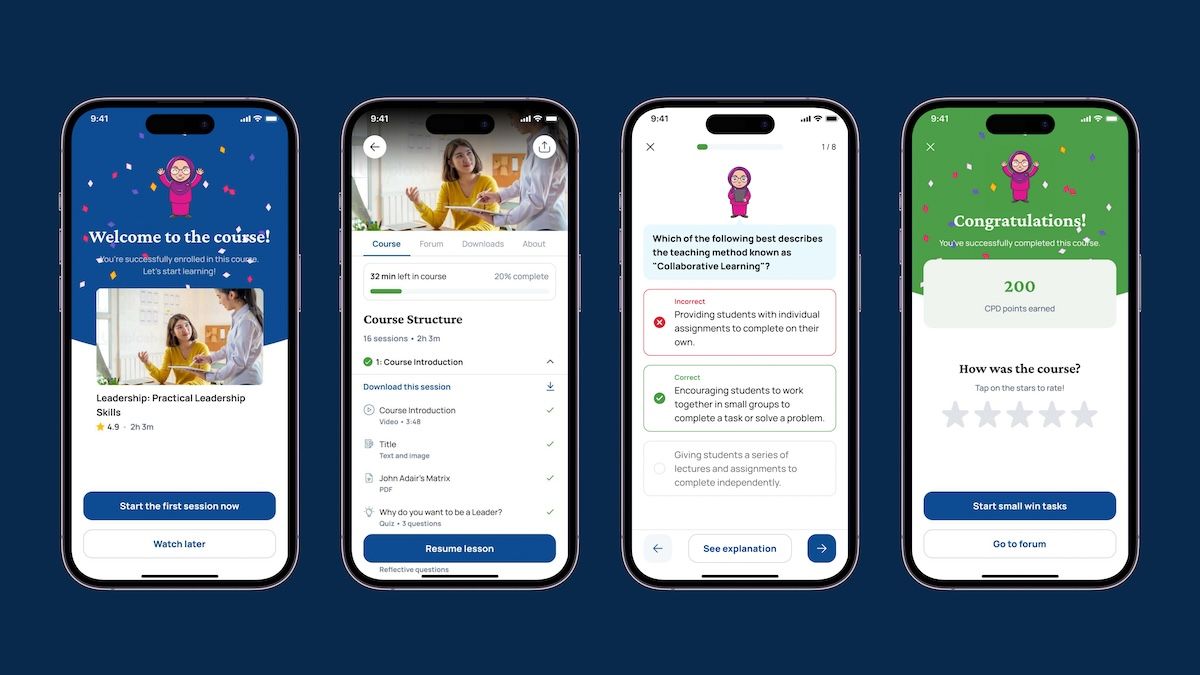Educational App Development: Types, Features and Best Practices

Educational apps will become increasingly popular in 2023 and are projected to democratise education. According to Business of Apps, the global educational apps market is predicted to grow steadily at a CAGR of 8.9% from 2023 to 2030.
The increasing popularity of educational apps can be attributed to the growing use of mobile devices in education delivery and the convenience and accessibility they offer. According to the Pew Research Center, 91% of teens currently go online utilising a smartphone at least occasionally.
Educational apps have the potential to disrupt the education ecosystem and become the go-to resource for learners of all ages. This article seeks to fully delve into the world of educational app development, highlighting its benefits for educators and students and the cost implications for development.

What constitutes educational app development?
An educational app is essentially any specialised software that facilitates virtual learning and teaching in a highly engaging, interactive, and accessible manner. In practice, these apps can be employed by educators, students, and parents.
By the same token, educational app development is the methodical process of creating mobile apps and web educational apps to orchestrate virtual teaching and learning.
Importance of educational apps in modern education
Right off the bat, educational apps provide teachers with powerful tools for assessment and feedback, allowing for more personalised learning experiences without being confined to specific locations and schedules.
In essence, these apps offer a broad range of benefits, from easy accessibility, study flexibility, and cost-effectiveness to interactive and gamified educational experiences.
Furthermore, in the era of digital literacy, the deployment of mobile apps in education prepares students for an uncertain future by instilling in them the skills needed to navigate the increasingly digital world.
This consequently fosters problem-solving, creativity, and digital literacy, which prepares students to be ultra-competitive in an evolving world.
Educational apps also offer unprecedented access to a wealth of knowledge from across the globe, opening up limitless possibilities. For example, engineering students in Malaysia can easily learn new cutting-edge concepts from peers in Uganda, at their own pace and convenience.
Types of educational apps
Educational apps are typically categorised into disparate types based on their target audience and focus areas, namely:
For early learners
These types of apps are expressly designed to help young children develop basic skills such as reading, writing, and arithmetic. They often constitute interactive storybooks and letter and number recognition games that make learning fun and engaging for young learners.

Subject-specific apps
These apps are built to help students learn specific subjects such as math, science, history, and language arts. They often include interactive lessons, quizzes, and games to help students learn and retain subject-oriented information.
Generally, such apps deepen students’ understanding and mastery of key concepts, especially those seeking additional practice and remediation.
Exam preparation apps
Exam prep apps are designed to help students prepare for standardised tests and exams like the SATs, GMAT, and TOEFL. They normally contain practice tests, flashcards, and progress-tracking features to help students identify areas for improvement.
Additionally, they may offer timed assessments, and detailed explanations of answers to help students achieve academic excellence.

Language learning apps
These apps are designed to help users learn new languages. They are typically designed with interactive exercises and tailored vocabulary-building exercises, to help users practice their listening, speaking, reading, and writing skills.
Some language learning apps may also offer live tutoring sessions with native speakers, and personalised learning plans based on individual goals and skill levels.
Learning management systems (LMS)
LMS apps support the delivery of educational content and track student progress. They usually constitute features like course management, discussion forums, grade tracking, and communication tools to help teachers and students stay connected from anywhere with an internet connection.
Essential features of educational apps
The most popular and effective educational apps maintain several distinct features, such as:
Interactive and engaging content
Effective apps usually constitute interactive and engaging content to keep users motivated and focused on learning. They normally feature interactive quizzes, gamified challenges, simulations, and multimedia elements (like videos, animations, and audio) to make learning immersive. This consequently enhances retention and comprehension of educational materials.
User-friendly design
Education apps can be utilised by different language groups. As such, they should be intuitive and easy to navigate for users of all ages and technological proficiency levels.
Furthermore, a simple design that even incorporates multilingualism helps to accommodate diverse learning styles and preferences. Thereby, ensuring that users focus on learning without getting frustrated by convoluted or confusing interfaces.
Progress tracking and feedback
A good app should provide real-time feedback and tracking mechanisms. This feature helps students identify areas for improvement and measure their progress over time.
For example, progress dashboards, and achievement badges to track learning milestones and set achievable goals. Such mechanisms help users stay motivated and informed about their learning journey.
Customisation and personalisation
Effective educational apps usually offer customisation and personalisation features that adapt learning paths based on the user's pace and learning style. Such features help students learn at their own pace and in a manner that suits their learning styles and interests.
Offline accessibility
Access to consistent internet connectivity is not a guarantee for every student. As such, a modern education app must maintain offline mechanisms to make content available without an internet connection.
Allowing users to download educational materials, videos, and quizzes enables learning to continue uninterrupted regardless of internet availability.
Best practices in educational app development
To develop an educational app that delivers engaging, accessible, and personalised learning experiences for students, kindly consider the following tips:
Understanding the audience
Educational app development should be user-centred and tailored to the age and educational level of the intended audience. For example, apps for children should have bright colours, animations, and cartoonish characters. However, apps for adults should have a minimalist design and advanced navigation.
Ensuring content accuracy and relevance
It is imperative to collaborate with educators and subject matter experts during app development to ensure the accuracy and relevance of the educational content. This collaboration ensures that the app aligns with academic standards whilst providing value to the users.
In fact, content should be iteratively reviewed and validated to ensure it remains a trusted and valuable resource for learners.
Incorporating diverse learning methods
Consider incorporating disparate teaching methodologies to address different learning styles. This can make the app more inclusive whilst ensuring learners retain information better.
For example, gamification elements like badges, leaderboards and points, as well as interactive multimedia content, make learning more immersive and enjoyable.
Regular updates and iterations
It’s imperative to keep the app updated with the latest educational standards and emerging technology. Regular updates and iterations can improve the user experience and address any issues.
This can also ensure that the app remains competitive in the rapidly evolving educational technology landscape.
Privacy and security
Adhering to regulations concerning data privacy, especially for minors, is crucial. To protect sensitive information such as educational records and personal data, consider implementing solid data encryption, secure authentication, and transparent data handling practices.
Educational apps development cost
Educational app development costs are influenced by various factors, for example:
- Platform choice: Cross-platform development is a more cost-effective solution than native development. This is because it allows developers to write code once and simultaneously deploy it on multiple platforms.
- Complexity of features: The complexity and scope of features desired in the educational app significantly influence development costs. More complex features like video consultation and interactive simulations typically require additional development time and expertise, which can increase costs.
- Compliance and security features: Ensuring compliance with regulatory standards via advanced security mechanisms can add complexity and cost to the development process.
- Basic app development vs. advanced feature-rich apps: Basic apps with generic capabilities are generally less expensive to develop than feature-rich apps like those with augmented reality mechanisms. c
- Maintenance and update costs: Regular updates are necessary to ensure the app remains compliant with regulatory requirements. However, maintenance and update costs can add up over time, which may considerably affect development costs.
Where to get educational app development services in Malaysia?
As technology continues to evolve and improve, the demand for such apps in education is only expected to become more widespread. So, to build an educational app that is state-of-the-art, you require the right partners to hold your hand.
Techies maintains a development studio that is experienced in creating world-class educational apps. Collaborating with educators, subject matter experts, and curriculum specialists, the Techies team consistently aims to build inclusive education apps that can be accepted by different educators and student groups, across disparate regions.
Read our case study: LADAP Plus educational app development
Future trends in educational app development
As technology advances, educational apps will likely continue to evolve, offering even more innovative ways to learn.
With the incredible advancements of AI (Artificial Intelligence) and ML(Machine Learning), we may see more virtual tutoring apps capable of providing instant feedback and support to learners. In 2025, we may also see the appreciable advancement of immersive VR (Virtual Reality) and AR (Augmented Reality) learning environments.
For instance, VR can be deployed to create virtual field trips, allowing students to explore historical sites. AR could also be employed to conduct experiments and learn in a safe and controlled environment.
Conclusion
Educational apps are becoming the go-to resource for learners and teachers alike. This is because they can personalise learning experiences and provide interactive lessons that cater to a wide range of educational needs.
Learning is inherently a social process, and these apps fit well within this ethos as they provide remote access to peer reviews, discussion forums, or collaborative projects. This enhances the learning experience and builds a sense of belonging among users.
Explore our web and mobile app development services in Malaysia at Techies, and don't hesitate to leave your contact information here.
About Author
Kok Weng
Kok Weng Kong is a tech enthusiast and problem-solving expert with a passion for technology and innovation. As the Founder & CEO of Techies App Technologies Sdn. Bhd., he specializes in building beautiful web and mobile applications and providing branding and marketing solutions for businesses. With a background in Information Technology and extensive experience in the industry, Kok Weng Kong excels in creating innovative solutions for various tech challenges.

Digitizing businesses since 2017
© 2025 Techies | All rights reserved


